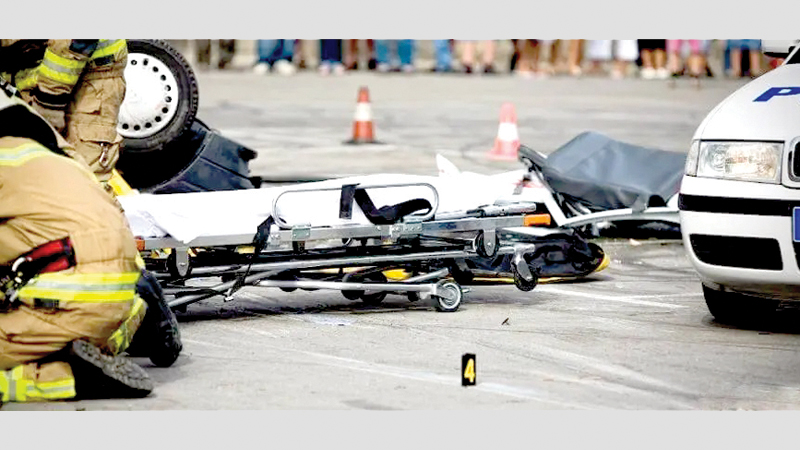 The profile of road traffic victims from across Sri Lanka shows that more than half of all road traffic deaths every year are among exposed road users: pedestrians, cyclists, and motorcyclists.
The profile of road traffic victims from across Sri Lanka shows that more than half of all road traffic deaths every year are among exposed road users: pedestrians, cyclists, and motorcyclists.
The financial losses to both the victims and the State are a national issue currently due to the uncontrollable nature of frequent road accidents.
Road safety has been an extremely critical issue for Sri Lanka for the past several decades. According to the Police Media Unit, in 2022, 19,000 road accidents were reported, of which 2371 were fatal. According to the report, most frequently, the victims were motorcyclists, pedestrians, and cyclists. Notably, motorcycles, private buses, and three-wheelers are involved in a noteworthy proportion of road accidents.
The losses of road accidents arise from the loss of income for the family if the victim is an adult or the loss of human capital if the fatality or injury occurred to a child.
Whichever it is, the burden on the country’s health care system is overwhelming and causes huge medical costs for both State coffers and individuals, which would have been otherwise avoided.
Also, due to the large number of accidents throughout the country, hospitals struggle to allocate resources, impacting other patients.
Injuries occurring from road accidents cause undesirable emergency treatments, surgeries, and long-term hospitalisation, costing substantial negative consequences to public funds.
Likewise, property damage from accidents is not only detrimental to vehicle owners but also to public property. In addition, accident-related legal proceedings such as expenditure on law enforcement resources, court trials, personal claims, and so on can cost substantial amounts of funds to the Government.
Police sources reveal that the cost of proceedings in a traffic-related death can cost up to a million rupees to the taxpayer for legal proceedings alone. Hence, counting the 30,000 lives lost during the past 10 years, the cost to the Government can easily be billions of rupees in legal expenses and the cost of police investigations.
It is a fact that accidents are unsought occurrences and often unintended. Nevertheless, they are socially and economically undesirable. Studies have revealed that road accidents not only claim human lives but also impact the economy as well.
Also revealing a new angle, during a recent media briefing in Colombo, Director, Traffic Administration and Road Safety, Manoj Ranagala, the Senior Superintendent of Police, disclosed that at least 115 children died due to road accidents from January to October this year. As the top policeman in charge of road safety, he said that most often the offenders were irresponsible and inconsiderate drivers.
Multiple reasons, such as overspeeding, drunken driving, distractions, disobeying road rules, and avoiding the use of proper safety gear such as helmets and seat belts, cause fatalities on roads most often. Despite heavy fines introduced recently for traffic violations, the number continues to escalate.
This means that the errant drivers and riders ignore the fines. The common practice is that these misbehaving drivers obey road rules only when police officers are present.
Enforcement officers
Regrettably, in Sri Lanka, unlike in many developed countries, technology-based systems do not exist, and law enforcement officers must always be physically present on the roads.
In Sri Lanka, the most common offence among drivers and riders is gross disregard for traffic laws or other road rules. The gravest culprits are private bus drivers, three-wheeler drivers, and motorcycle riders.
Research reveals that distracted driving by these offending drivers contributes to an average of 50 percent of road accidents. A reckless driver can make an unexpected mistake that can be fatal to another person who is using the same road.
Misbehaving drivers and riders make many common errors. Driving carelessly through a roundabout, willfully ignoring other drivers and riders, is one such frequent blunder of undisciplined Sri Lankan drivers and riders.
If carefully observed urban traffic flow, rarely a driver or rider gives right of way. Everyone wants to go first, disregarding the impending danger.
Similarly, ignoring pedestrians, ignoring traffic signal lights, using cellphones, changing lanes, overtaking from the left, and not keeping a safe distance from the vehicle in front are some of the careless driving practices of Sri Lankan drivers and riders.
Driving under the influence of alcohol or any other drug causes not only dangerous road crashes but also creates many other harmful consequences.
Commendably, apart from the heavy fines, mass media and law enforcement agencies have been attempting to educate drivers about the adverse repercussions repeatedly for the past few decades.
Yet, accidents due to drunk driving are still a menace to society. Perhaps more stringent laws with substantially heavy fines and even imprisonment, like in many developed countries, are required to curtail the drunk driving threat.
Except for reckless driving, there are other noticeable factors that cause road accidents. The carelessness and illiteracy of pedestrians are also two such factors.
If one observes carefully, plenty of live examples can be seen in urban areas where pedestrians completely ignore commonly known road rules such as flouting pedestrian crossings, speaking on mobile phones while walking, disregarding vehicular movements, and so forth.
Also, to a certain extent, bad road conditions on some roads, such as potholes, damaged roads, eroded roads, merging of rural roads with highways, diversions, and illegal speed breakers, can cause accidents.
Throughout the past two decades, as preventive measures, authorities have attempted to bring in various remedial methods to reduce the alarming number of road accidents. However, despite such efforts, evidently, the results are not very promising as yet. In this context, experts are of the view that the authorities must develop a multi-prong strategy to confront the challenge.
Enforcing traffic laws in the strictest possible manner is the most effective method of controlling errant drivers, riders, and even pedestrians in Sri Lanka.
Consistent and constant implementation of laws can be a deterrent to potential violators. This is the language most of the drivers and riders would undoubtedly understand.
However, in order to effectively enforce laws, an effective police force is needed. Although the Sri Lanka Police Department is said to have deployed over 88,000 police officers to enforce the law, seemingly there is an acute shortage of traffic police officers on the roads to actively engage in actual implementation.
Apparently, the number of traffic policemen on the roads is completely inadequate for road rule violators, considering the number of operating vehicles on Sri Lankan roads, which stands at a staggering 8 million for the population of 21.6 million as of now, and the road network of 12,000 kilometres. According to subject veterans, this is 50 percent more vehicles in the country than what is manageable.
As a preventive action, it is essential to enlighten road users about the dangers of reckless driving, speeding, and drunk driving.
Also, public awareness must be increased about the expenditure the Government is forced to make on the health, legal, and social consequences of accidents, which is an intolerable burden on taxpayers’ funds.
The authorities must organise intense awareness programs for drivers, pedestrians, police officers, and even the general public to emphasise the importance of obeying traffic laws, rules, and regulations.
Consequences
All stakeholders should be made aware of the consequences of violating traffic rules, such as fines, imprisonment, or loss of driving licences, through constant and relentless campaigns to prevent further escalation of accidents.
The impacts of road accidents caused by errors by drivers, riders, or pedestrians lead to extensive social and economic losses.
Preventing road accidents and reducing their effects requires a concerted effort, involving not only law enforcement and regulations but also education and awareness initiatives aimed at promoting safe and responsible driving behaviors.
Recognising and addressing the multifaceted impacts of road accidents is essential to fostering safer roads and more resilient communities.






